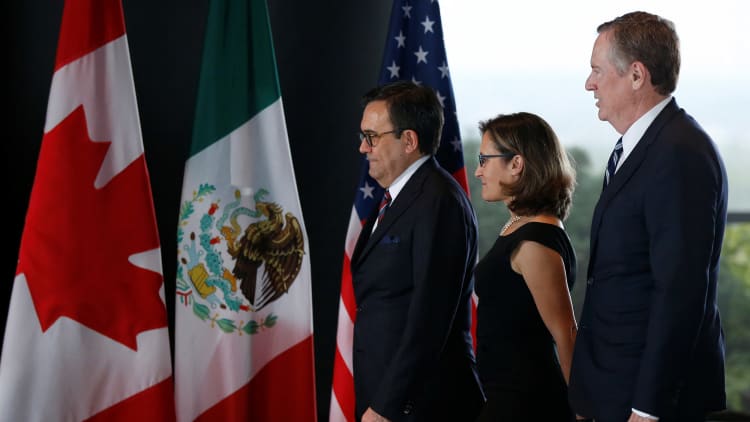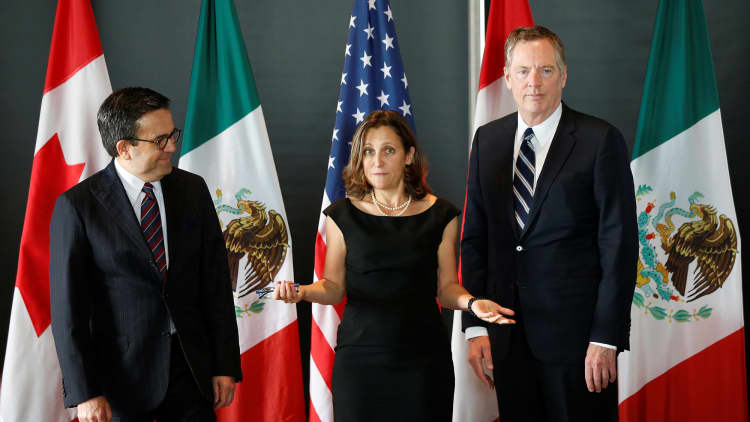
Talks to revise the North American Free Trade Agreement will go into next year amid clashes over how best to change the deal, top officials said Tuesday.
In a joint statement following the fourth round of talks, officials from the U.S., Canada and Mexico said "significant conceptual gaps" will change the negotiating time frame. The countries will schedule more negotiating rounds "through the first quarter of 2018" after new proposals "created challenges," the officials announced.
The three countries wanted to renegotiate the deal before the end of the year. A fifth round of negotiations in Mexico City will be delayed until Nov. 17 so negotiators can consider the proposals.
After the round of talks concluded, U.S. Trade Representative Robert Lighthizer told reporters that the U.S. is not taking active steps to withdraw from NAFTA despite the disagreements. He added that he will consult with President Donald Trump about the next steps.
A joint statement Tuesday from Lighthizer, Mexican Economy Minister Ildefonso Guajardo and Canadian Foreign Minister Chrystia Freeland following a meeting highlighted progress and the desire to reach a deal to rework the agreement.
But individual remarks delivered after the joint statement were decidedly more pessimistic about finding common ground.
"Frankly, I am surprised and disappointed by the resistance to change by our negotiating partners on both fronts," Lighthizer said.
Some proposals put forward would "turn back the clock" and potentially "run counter" to World Trade Organization rules, Freeland said.
Guajardo, for his part, said that in order to reach a "fruitful" agreement, "we must understand that we all have limits."
In the meeting before officials spoke Tuesday, Mexico and Canada were expected to firmly reject protectionist proposals put forward during the current round of talks, CNBC reported. The countries plan to push through with negotiations despite the rejections.
In the last week, U.S. negotiators formally proposed that a new deal with Canada and Mexico favor American manufacturing and end after five years if all countries do not renew it. The U.S. Chamber of Commerce called those measures "poison pills," while participants in the talks called them "nonstarters."
Trump has repeatedly slammed the 23-year-old trade agreement. In an Oval Office meeting with Canadian Prime Minister Justin Trudeau last week, Trump again threatened to scrap the free trade agreement if the countries cannot strike a deal to rework it.
"If we can't make a deal, it'll be terminated and that will be fine," Trump said. "They're going to do well; we're going to do well, but maybe that won't be necessary. But it has to be fair to both countries."
Lighthizer said the end of the year was not meant to be a "hard target" to reach a deal. He does not want the extension of talks to interfere with the Mexican presidential election in July of next year.
While he wants to reach an agreement, Lighthizer added that the countries will "do just fine" if NAFTA gets terminated.
Most members of Congress, as well as American companies, do not want to see the deal get scrapped.
Canada was the United States' second-largest goods trading partner last year, while Mexico was the third, according to the office of the USTR. Mexico sent more goods to the U.S. in 2016 than every country but China.
Trump has focused his ire on trade deficits, which he says hurt the U.S. economy and American workers. The U.S. had goods trade deficits of about $63 billion and $12 billion last year with Mexico and Canada, respectively, according to the USTR.
— CNBC's Kayla Tausche contributed to this report.
WATCH: We have no active process to withdraw from NAFTA



